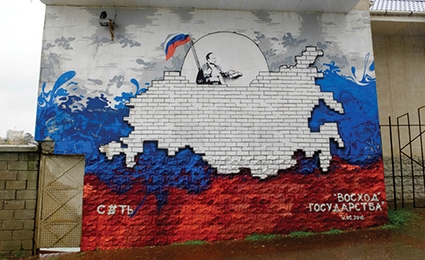Beneath All Russia’s Misfortune Lies Ukraine
Op-Ed
The recent spike in the US-Russia confrontation once again shows that a compromise fitting both parties’ interests will be unlikely to happen. Recent US sanctions against the Russian oligarchs, as well as Washington’s political decisions across Eurasia, once again reflect the notion that Donald Trump as a sole figure could not have changed the White House’s foreign policy as there are far too many fundamental differences between the two sides. Still, neither analysts nor politicians forget that the foundation for the Russia-West confrontation in the 21st century is Ukraine. We need to bear this in mind when Russian policy moves are considered across Eurasia and elsewhere.
For Russia, Ukraine is important both economically and strategically: even without Poland or the Baltic States, Russia retains the status of a “Eurasian Empire”. Without Ukraine, Russia will increasingly become a state with more borders in Asia than in Europe. This will in turn make Russia more heavily involved in long-term Islamic conflicts along its entire southern border. Although there have already been several examples of Slavic countries (Slovenia, Poland, Czech Republic, etc.) joining the EU and NATO, Ukraine following their path will irreversibly undermine the notion of the so-called “Slavic Union” and would leave Russia with just its Belarus brethren.
For the US/European Union (EU) keeping Ukraine is a strategic imperative as it tries to prevent the resurgent Russia from projecting its influence in its immediate neighborhood. Restoration of Russian influence over the Ukraine territory would increase Moscow’s power over the Black Sea and the South Caucasus and will threaten Eastern European security.
Even in Georgia, which does not feature high in relations between Moscow and Washington, differences remain as deep as ever. The country remains pro-western and the US has been open in its support for the country’s territorial integrity. However, differences go far deeper than Tbilisi’s pro-western course: in Russia’s view, Georgia can become a military basis for NATO expansion in the region, which will fundamentally undermine Russian positions in the Caucasus overall.
Russia and the US also disagree on many other fronts. Syria and North Korea are just several of them. Although, overall, it is unlikely that Washington and Moscow will militarily collide, Trump’s statements via twitter reflect how deep anti-Russian sentiments are in America. True, for Russian core interests, Syria does not represent problem number one, but Ukraine does. Syria is far, Ukraine close enough to cause Russian civilizational fears.
Civilizational because for the first time in over 400 years, Russian state building notions are surpassed by the European models.
But beyond the “civilizational” also lies a more fundamental issue - economy. In previous articles for GT, I have written how the EU and US are marching to the east, far deeper and far more fundamentally (through economic cooperation and elite co-optation) rarely, if ever, seen in the past Russia-West relations. And the Russians are worried, but to their credit, Putin and others seldom express that.
We often forget that Ukraine, and less so Georgia, are the questions around which revolve all Russian foreign policy actions: attempts to bargain military gains in Syria for advantages in Ukraine.
Without Ukraine, Russia will be geographically far retracted into the Eurasian continent, far from Europe, not entirely in Asia. In fact, Russia might be seeing a deep geopolitical isolation. In fact, this is what many in Russia already think. Putin’s long-time aide on domestic policy issues, Vladislav Surkov, in a recently published piece wrote that Russia’s attempts to marry Europe ended after the Ukraine crisis. Now, Russia will be facing long-term isolation. A striking admission on a part of the member of the Russian ruling elite.
Moscow needs Ukraine and the restoration of all relations between Russia and the US/EU will rely upon this country. Unless one of the powers makes significant concessions, the relations will be fundamentally strained.
By Emil Avdaliani












